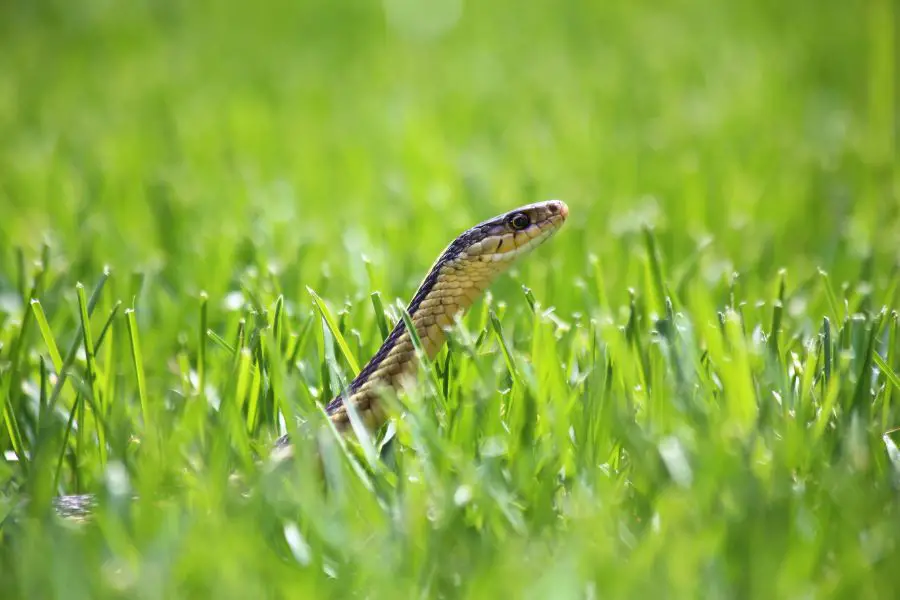It’s summertime, and you know what that means: pool time! A dip in that cool, refreshing water can be a nice respite from the sun’s heat. Plus, who doesn’t love hanging out by the pool with a cold drink in their hands?
No one!
Until, of course, you find a snake in the pool! Even if you find one peacefully basking on the concrete, just the sight of it can run chills up your spine.
So, do pools attract snakes? Yes, but not because of what you think.
To find out more about why snakes are attracted to pools and what you can do about it, keep reading.
Why Are Snakes Attracted to Swimming Pools?
Snakes are cold-blooded animals. So, they’ll take any chance to enjoy a bit of warmth, including the pool area.
Yet, why the pool in particular? Here are a few of the most common reasons snakes love hanging out by the pool.
Untrimmed Hedges
Snakes like to find shelter in any place that’s dark and out-of-sight. This makes any type of thick vegetation the perfect hide-out.
So, if you have any bushes that need to be trimmed near your pool, do it now. This way, the snakes won’t have any place to camp out where they can be near the pool and the area around it.
Stagnant Water
While you’re out there trimming your hedges, look for any puddles or areas of stagnant water in the backyard. It could be one reason why snakes are hanging out in your yard.
Snakes will use this water for drinking and staying hydrated. They also soak in them to keep cool in the hot season or warm in the cold season.
Rodent Presence
Another thing many people don’t factor in is the presence of pets in the home. Leaving pet food outside or near the pool will attract late-night visitors, mainly rodents, and we all know how much snakes love snacking on those.
Keep in mind that rodents also love dumpster diving. So, make sure you put the lid tight on the garbage bins to keep both rodents and snakes far away.
The last thing you want is to find a mouse in the pool along with a snake chasing it.
Pools and Snakes: A Quick Overview
Scroll down to learn more about which types of pools snakes like more.
Do Snakes Like Salt Water Swimming Pools?
Yes, snakes like saltwater pools. For one, their bodies aren’t affected by the chemical composition of the salt.
Plus, salt water is denser than chlorinated water, so it’s easier to float in. So, since snakes are pretty good swimmers to begin with, being in saltwater makes swimming that much more enjoyable!
Even land-loving, non-water species like the occasional dip in the pool to cool down and hydrate.
They also love soaking in water when they’re molting. This process of shedding their skin is mostly gradual.
So, getting their skin wet helps speed up the process while providing them with the added benefit of staying hydrated as well.
Do Snakes Like Chlorine Pools?
No, snakes hate chlorine and will do their best to stay away from chlorinated pools. Chlorine can cause snakes to become irritated and potentially more aggressive than their normal temperament.
If you find a snake in your chlorine pool, chances are it fell in by accident. Most likely, it was busy chasing a rodent or other prey and wasn’t able to stop itself in time.
Does Chlorine Kill Snakes?
Chlorine is toxic to snakes, particularly after prolonged exposure. Once they absorb it, it’ll slowly degrade their insides and poison them.
So, if a snake has been exposed to chlorine, there’s a fair chance it may die.
Even if the chlorine does not kill the snake, if the snake remains in the pool long enough it risks being entrapped in the skimmer. The suction of the skimmer could potentially pull the snake underwater and drown it –not a fun surprise to find during your daily pool check!
How to Remove Snakes from Your Pool?
While snakes may be unsightly, they’re actually easy to remove from a pool once you know how. Check out these two basic methods to remove snakes from your pool.
Use a Net or a Pool Pole
If you have a pool in your backyard, chances are you own a skimmer net with a long, telescopic pool pole.
Using the skimmer net is easy and quick. Just dip it underneath the snake and quickly lift up. Just make sure to hold the handle steady to avoid losing your balance.
Otherwise, if you don’t have a traditional pole with skimmer net, just try to find a different long object. It could simply be a broom handle or even a long branch.
Start by bringing it close to the snake, then wait for a second or two for the snake to cling onto your makeshift pole. Remember, that poor thing is probably just as scared as you are, and not being able to get out of the water on its own is only adding to the panic.
Keep an Eye on the Skimmer
The main job of a skimmer is to catch debris, leaves, and other wastes floating around in the pool. It then collects them in a basket to prevent any potential blockage that can happen if this debris reaches the pump or filter system.
If using the net or pole doesn’t work, you have to wait for the snake to end up in the skimmer basket. As long as the pump is running, then the water will circulate and flow through the skimmer, where the snake will end up.
The next step is to remove the skimmer basket and let the snake loose far away from the house. The problem with this step is that the handle to the skimmer basket is short and some people don’t like being that close to the snake.
Yet, don’t panic. You can always use a hook or pair of tongs to grab the handle, take it out, and deal with the snake—all while you’re at a safe distance.
Tips on Keeping Snakes Away from the Pool
Now that you know what attracts snakes to swimming pools, it’s time to keep them as far away as possible. Here are a few simple tricks you can try to make sure they don’t come anywhere near your pool.
Take a look.
Maintain the Landscaping
Stand at each corner of the pool and scan the area for possible places a snake can hide. Then, make a list and eliminate them one by one.
Do you have low-growing shrubs, hedges, or bushes around your home or near the pool? Then, remove them. If that sounds too drastic, then make sure you trim them frequently.
Also, mow the lawn every week as well. Snakes won’t be able to hide in the grass if it’s always cut short.
Apply Snake Repellent Around the Pool
Snakes have a keen sense of smell. When a snake sticks out its tongue, it gathers chemicals from the air and ‘smells’ them via a super-sensitive olfactory organ located at the roof of its mouth called the Jacobson’s organ.
In addition, because they’re always slithering on the ground, they’re highly aware of everything beneath them. So, as a result, they don’t just slide over anything unless they’re entirely sure it’s harmless.
Add to that the fact that almost all liquids can easily permeate through their skin. In fact, it’s how they stay hydrated by simply soaking in some water, which gets absorbed into their skin.
The problem is that vinegar and ammonia are both toxic for snakes. So, if you pour some around the perimeter of your pool, they’ll pick their tails up and make a quick get-away to avoid going anywhere near them.
Another tip is to use a 1:1 mixture of vinegar and hydrogen peroxide. Together, they’re known to be an effective snake repellent. Plus, they make an excellent all-natural cleanser as well.
If you don’t want to keep pouring harsh-smelling liquids around the pool, soak some rags in these liquids. Then, place them in several unsealed plastic bags and scatter them around your yard.
Cinnamon and clove essential oils are also two all-natural potent snake repellents.
Conversely, if you want something more potent, you can always opt for a chemical barrier, like granular sulfur, which snakes hate the smell of! It also irritates their skin, which ensures they won’t be coming back any time soon.
Keep the Pool-Side Area Clean
As mentioned above, pet food remnants, opened garbage bins, and other remains are just an invitation to rodents. Then, once those find their way to your yard, you can guarantee that snakes aren’t far behind.
So, to avoid all that headache, make sure you keep the yard and the area around the pool clean and well-maintained. Set up a cleaning schedule and remove any wastes, stagnant water, and anything else that can entice snakes to pay your pool a visit.
Grow Snake-Repelling Plants
Plants like marigold, garlic, and lemongrass all look good and smell amazing. Yet, to snakes, they’re repugnant and odious, which makes them the ultimate snake repellents.
Here are a few more snake-repelling plant ideas to add to your list:
- Mother-in-Law’s Tongue
- Wormwood
- Flowering onion
- Cinnamon
- Snakeroot
- Pink agapanthus
Final Takeaway
While they may be fascinating creatures, no one wants a snake in their pool! Luckily, we’ve covered the common question: why do pools attract snakes, and what to do about it.
So now, it’s time to go out to your pool, do some hedge-trimming, pour some liquid snake repellent, and plant snake-repelling plants. Then, if a snake does fall into your pool, use our handy removal tips, or you can call a professional to do it for you.
After that, you can finally relax and enjoy a cool dip in the pool without worrying about slithering reptiles swimming next to you.
Happy (creature-free) Swimming!
Husband and father of three (actually, four if you include the pool). I’m an avid DIY-er and weekend warrior that enjoys taking up new projects around the house to help us maximize leisure right at home. I enjoy researching and sharing various tips, tricks and knowledge to help others make their home an oasis.

